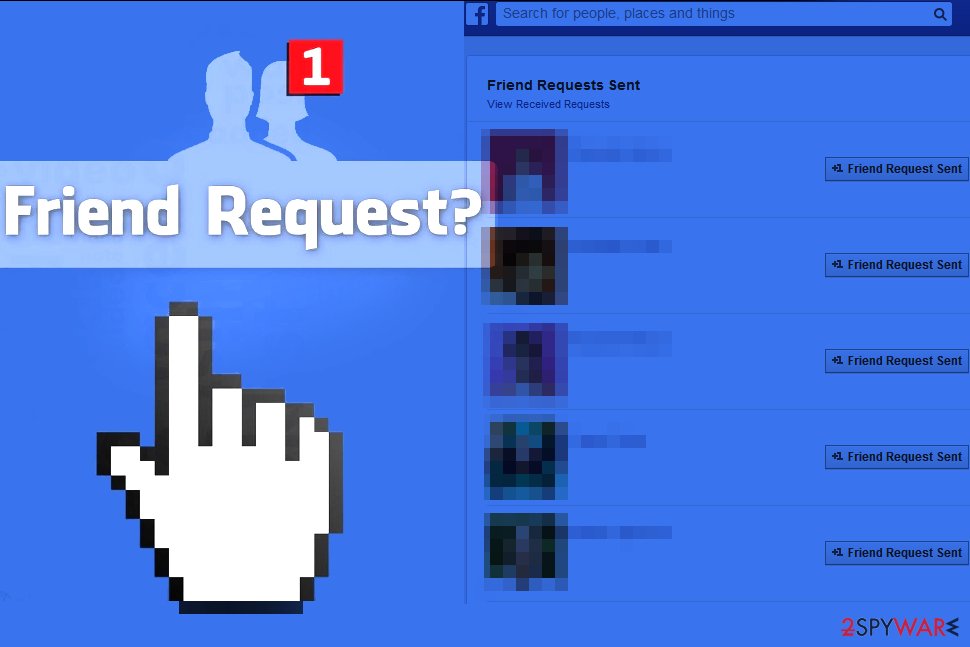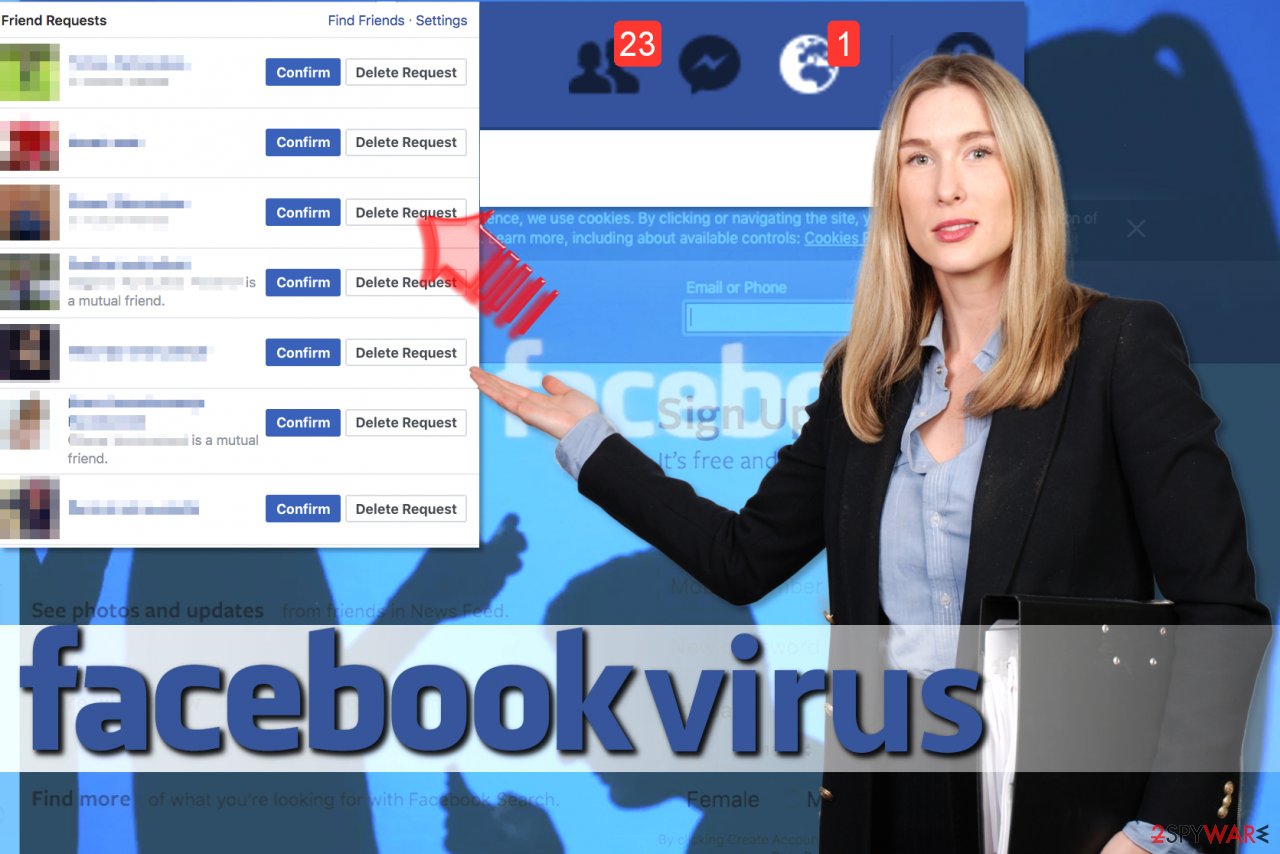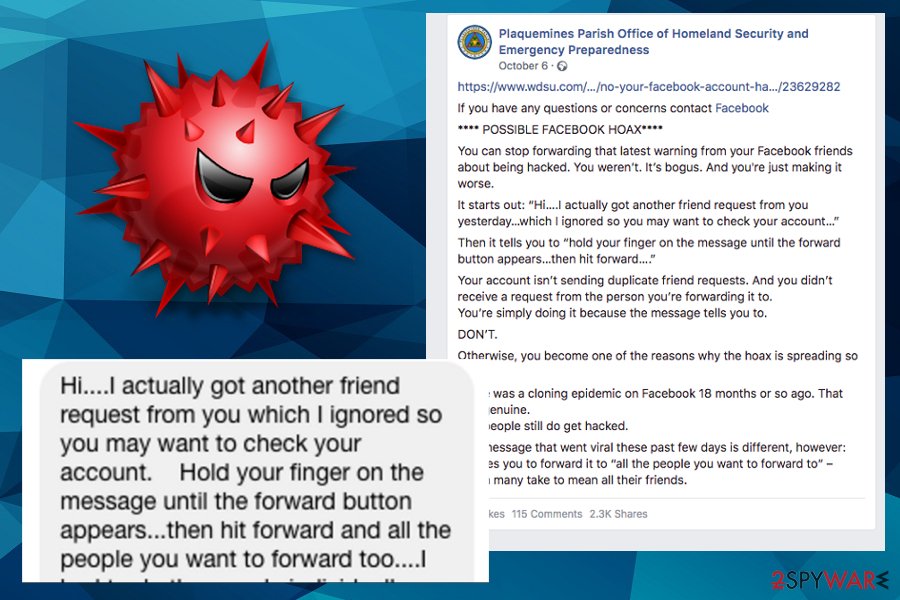Facebook Sending Random Friend Requests
Facebook Friend Request virus attempts to add new friends without user's knowledge

Facebook Friend Request virus is a malicious app[1] or a program that sends friend requests to strangers without user's permission. In addition, scammers might be using your public photos and posts to create a fake version of your account and use it to contact your real friends with intention to swindle money[2] or personal information from them. The “Friend Request” virus belongs to a huge malware category known as Facebook virus and it is used to scam inattentive social media users.
We see an increased activity of Facebook Friend Request virus in 2017[3]. The techniques used by scammers hardly changed – they either create fake profiles or malicious apps to scam users or their friends. As always, the primary purpose of these fraudsters is to swindle money or take control over someone's account. Typically, the reason to hack accounts is to collect personal information or use it for further distribution of malicious links.
The viruses and scams associated with suspicious friend requests on this giant social media network can be divided into several categories. Let's review each of them to learn what to expect from them and how to avoid or remove Facebook Friend Request virus.
Versions of Friend Request virus:
Facebook sending friend requests automatically. Does Facebook send friend requests without your permission? If so, it is clear that your account is unprotected and someone has permission to add new friends on your behalf. In most cases, the culprit is a malicious app that asked for such permissions before you started using it. You may have given the app the permissions without actually reading them – it happens quite often.
If you are looking for a solution to “Facebook adding friends for me” problem, we can provide one. To stop the social network from adding friends for you, you must delete the app that has permission to add new friends for you. We provide a method that helps to revoke app permissions using the web, not a mobile app.
- Log into your Facebook account.
- Click on the small arrow in the top right corner of the screen on the blue Facebook toolbar. Select Settings.
- Now, look at the left side of the screen and find Apps section. Click on it. This will take you to App Settings.
- Here, you will see a list of apps below “Logged in with Facebook” section. Click Show all to expand the list. Hover your mouse over suspicious apps and click on X that appears next to them. You can also choose to delete all activities (including posts, photos, and videos created with or posted via the app). Click Remove to confirm.
- Repeat until all suspicious apps are gone.
Facebook Fake Friend Request virus. This deceitful technique relies on fake Facebook accounts that are created using real photos of a certain Facebook user. Scammers track down a person that posts content publicly and steals private photos from him or her.
They create fake accounts and post pictures and even copy-paste original status messages posted by the victim. All of this is done in order to make an illusion of a real Facebook account, which scammers later use to mislead victim's friends and swindle money from them. Typically, scammers create a software that sends out friend requests to all victim's friends and later on send delusive messages asking to lend money.
What is more, such Friend Request virus can send a malicious link to victim's friends, asking them to click on it and see something interesting. This trickery is quite efficient because victim's friends trust the real person and want to see what they share. However, clicking on such links is highly dangerous, because these sites can be filled with malicious content.
Deceptive websites seek to force users to provide sensitive data or install harmful programs, so be careful! If your friend ever sends you a message with a link to suspicious website, ask him or her if the website is trustworthy.
Questions about Facebook Friend Request virus
Typically, scammers do not reply, but even if they do, we suggest you to check the profile of your friend – enter the name of him or her into Facebook search and see if it finds one, or two same profiles. The most obvious sign that you are dealing with Facebook Friend Request malware is that the person who has just sent you a friend request already sends links inviting to explore some suspicious websites or give money.




However, your computer can also be infected with such virus if you click on a link sent by a stranger or even a friend whose account was compromised. Usually, such links lead to a website that suggests adding a browser extension or installing an update “in order to watch the content.”
As a consequence, such malicious software can steal access to your social media account and use it to spread malicious messages to your friends and post deceptive posts on the timeline. In such case, react if any of your friends reports this to you. In addition to that, this type of virus can unblock contacts that you have blocked and add them to your friends again.
To fix this, scan the system with anti-malware tool like Reimage and remove Facebook Friend Request virus immediately. You can use a different anti-malware software for its removal, for instance, Malwarebytes MalwarebytesCombo Cleaner. After that, remove unwanted contacts manually.
Common distribution methods
The virus attacks Facebook's users via instant messaging. You may receive a misleading message that looks like it belongs to your friend and offers to click on a link in order to see a picture or watch a video.
Besides, clicking on every app on Facebook may also lead you to the infiltration of this virus because they are hacked by cyber criminals quite often. Once the virus is activated, it starts sending the requests to unfamiliar people and may also start accepting all pending friend requests that you ignored previously.
We also want to warn you that Facebook is not an entirely safe place, and there are some minor adjustments you can make to protect yourself and your friends. First of all, we strongly recommend you to make your friends' list private. If it is public, scammers can easily access it and send deceptive messages to them while pretending it is you. Besides, it is advisable to keep sensitive information private. If you can, make your photos accessible for friends only, too.
Frequently asked questions about Facebook virus
Question: I think that Facebook is sending friend requests without my knowledge. How can I stop this? I used to delete the sent requests manually but more and more appear every day. There must be a method to put an end to this!
Answer: Dear visitor, there are two things that you need to do to stop the social network from automatically sending friend requests and ensure that it never happens again. First of all, you must revoke permissions from malicious Facebook apps and then scan your computer for malware that you may have installed lately. Use the tutorial provided by us to secure your account and remove malware from your PC.
Question: I keep receiving random friend requests on Facebook – is that a virus? How can I know if my account is secure? Maybe my profile is included in target lists for scammers? Can you help me to figure this out? I once received a request from someone who was using my pictures!
Answer: Dear visitor, everyone receives random requests from time to time. You shouldn't worry too much about them – just ignore them or reject them. However, the fact that you received a friend request from a “fake” you indicates that your content is shared publicly and you need to take certain measures to protect it.
We highly recommend going to Facebook Settings > Privacy and change the Who can see my stuff? settings from “Public” to “Friends Only.” You can also limit the audience for posts that you have already shared.
Remove Facebook Friend Request virus
If you notice strange people popping up on your friends list out of nowhere, or if you see that something suspicious has been posted on your wall without your knowledge, it can be a sign of Facebook Friend Request virus' presence. As we have already mentioned, you should revoke app permissions using the tutorial we provided and then check your system for malicious or spyware-type programs that might be illegally controlling your account.
0 Response to "Facebook Sending Random Friend Requests"
Post a Comment